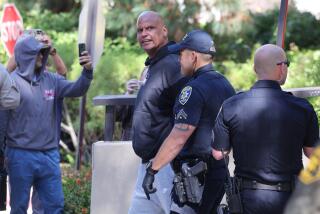3 Western Photographers’ Painful Ordeal in Iraq
- Share via
AMMAN, Jordan — Iraqi authorities on Saturday arrested three Western photographers, including Reuters’ Patrick de Noirmont, as they headed out of Baghdad after the government ordered Western newsmen to leave the country. They were held more than eight hours, much of the time blindfolded and handcuffed, and accused of spying. De Noirmont, 42, is now in Amman and tells his story:
Handcuffed, blindfolded and beaten, I was left slumped in a jeep by Iraqi guards who scurried for cover during an allied air raid on Baghdad.
Heavy explosions nearby rocked the vehicle. Anti-aircraft batteries opened up with thunderous staccato bursts but there was nothing I or fellow photographer Laurent van der Stockt could do to find safety.
When the raid finally ended, there was more misery. Our captors re-emerged and again beat us about the head and neck.
The ordeal in the car was traumatic. But possibly the most fearful moment of eight hours’ in the hands of the Iraqis came when an officer accused us of spying and threatened us with execution.
It began on Saturday. Obeying Iraqi orders for foreign newsmen to leave the country, I was heading out of Baghdad for the Jordan border with Van der Stockt and another photographer, Thomas Kern.
Van der Stockt, 27, is French and works for Gamma, a Paris-based picture agency, and Thomas, 26, is Swiss and works for Contact, an agency headquartered in New York.
At the wheel was our elderly Iraqi driver, Mohammed. Military personnel stopped our car near Baghdad’s international airport and ordered us to follow their vehicle to an army camp.
We arrived there just as soldiers ran for cover at the beginning of an American air raid, the latest in a relentless aerial assault which has turned Baghdad into a ghost town of empty streets and shuttered shops.
After huddling in a sandbagged foxhole during the 20-minute raid, our guards took us to a room. Stern but polite, an officer demanded to know what we had been doing in Baghdad.
He took our passports and documents issued by the Ministry of Information to facilitate our departure and exit at the border.
Then the guards put metal handcuffs on Laurent and Thomas, their arms behind their backs. There were no cuffs left for me so they tied my arms behind my back with strips of white cloth--the same material they used to blindfold us.
Guided like a blind man to a car, they told me to sit slumped forward--obviously to prevent me from seeing where we were going in case the blindfold slipped. My colleagues were taken to another vehicle.
Mohammed argued with our captors in Arabic, trying to explain that we were journalists and should be set free.
The car stopped, the man sitting in the passenger seat walked around it, yanked open the door and rained savage blows on Mohammed.
Shortly later, I was transferred, with rough shoves and kicks, to what appeared to be a military jeep. Laurent joined me. There was no sign of Thomas. Blows and sharp karate chops made sure we kept our heads pressed to the knees.
Even before the vehicle moved into gear, another air raid began. Our captors ran for shelter. We were left sitting, still slumped forward.
After the raid, we were moved again, still blindfolded.
At the next and last stop, Thomas joined us at what appeared to be a command post. Two officers began interrogating us, mixing questions with assertions that we were not what we said we were--journalists leaving Iraq with official permission.
“You are a liar,” one officer told me, after hitting me hard on the head. “You are accused of spying and you should know you are under the law of war.”
In Iraq as elsewhere, espionage in wartime is punishable by death.
Then they left us. There were voices outside the room and we heard the heavy tread of military boots as a guard paced up and down a corridor.
More than two hours later, we were taken away, herded into what appeared to be our original car and driven off.
The guards stopped on the road and took off the handcuffs --but not the blindfolds--before delivering us to the entrance of the Al Rashid Hotel, headquarters of the international press.
At last, the blindfolds came off.
“Sorry,” one of the guards said. They returned our equipment and left.
At the hotel’s air raid shelter, Saadoun al Jennabi, the Information Ministry official charged with looking after the foreign press, was surprised to see us back. Told what had happened, he was close to tears.
“I apologize, I am very sorry,” he said, hugging each of us.
More to Read
Sign up for Essential California
The most important California stories and recommendations in your inbox every morning.
You may occasionally receive promotional content from the Los Angeles Times.













